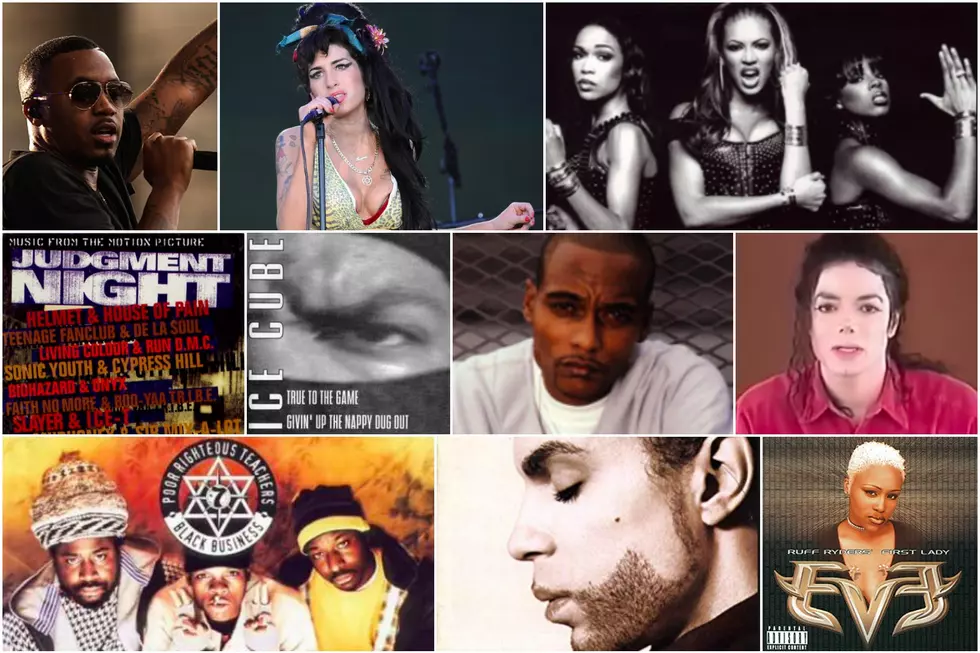
The British Invasion: How UK Artists Are Changing the Face of American Music
Fifty years ago, something revolutionary happened. On Feb. 9, 1964, the Beatles appeared on 'The Ed Sullivan Show.' It was the first time that an overseas act was so highly demanded by U.S. fans that they warranted an American TV appearance. The first-gen "British Invasion" was brewing, as artists from the U.K. were heading for the stars and stripes in droves. The aforementioned Beatles, along with the Rolling Stones, the Who and the Kinks were all leading their bases to run to home plate and make their mark on coveted U.S. territory. It worked. Some better than others, but it worked. It took some time though; The Beatles didn't start actively selling records on American soil until their fourth studio album, 1964's 'Beatles For Sale,' which was certified platinum.
It feels strange to consider any demographic to be "invading" the U.S. on a musical level in the 21st century. A band or an artist releases an album, and they may or may not have an accent when they speak, right? Sort of. While America prides itself on championing homegrown talent, more often than not, some standout stars weren't born within the 50 states. Our biggest selling American acts are not always American (read: Justin Bieber, Drake). The greatest influx of talent arriving in the U.S. over the past decade, though, has come from the United Kingdom. These acts not only penetrate the American market in a way that feels more domestic than international, but they're crossing genres seamlessly. Welcome to the second British Invasion.
It was circa 1997, when the Spice Girls made their impact on U.S. soil with their debut single 'Wannabe' (off 1996's 'Spice'). While the year prior the quartet achieved massive U.K. stardom, the famed girl group parlayed that into global success, breaking a record as the best-selling single by a girl group with a staggering six million-plus in sales. At that time, the rumblings of a new British invasion began.
Would the Spice Girls kick off another frenzy from our friends across the pond? Not necessarily. Their success became exclusive, carrying over into their follow-up album 'Spiceworld,' and later the "we're headed for breakup" 'Forever.' A feature film, dolls and countless posters were more a testament to what happens when pop stars bring mass hysteria, but the idea that they were breaking new ground for the Brits diffused rather quickly. Certain U.K. artists would travel stateside for fleeting moments (i.e. Joss Stone and even earlier Imogen Heap), but it wasn't enough to suggest a new movement was happening.
2006 was the year. Lily Allen arrived flanked by Mark Ronson, and her catchy lyrics, paired with her Jordans-wearing, prom dress-donning ways, reached stateside with her debut single 'Smile' off her first album, 'Alright, Still.' Lily made an easy transition into the U.S. alt pop scene. She possessed a strange semblance to hip-hop, and came armed with a foul mouth and relatable emo tendencies. 'Smile' would break the Billboard Top 50 in a few different categories, while 'Alright, Still' hit the top 20 mark, and was certified gold by the RIAA. Sure those numbers aren't gargantuan, but Lily's internet presence became prominent. To date, 'Smile' has over 29.5 million views on YouTube.
As an alternative to the cheekiness of Lily Allen, another young surly Brit named Amy Winehouse arrived. If Lily Allen was the Notorious B.I.G. (for lack of a better comparison), Amy was Tupac, far more pensive, tortured and a subdued genius. While her jazzy debut album 'Frank' has emerged as a cult classic, it was 2006's 'Back to Black' that tugged on America's heartstrings. The album reached No. 2 on the Billboard charts, sold over 20 million copies worldwide (double platinum in the U.S.) and swept the 2007 Grammy Awards.
Winehouse also became a fixture within hip-hop, working with Questlove of the Roots, Salaam Remi, and Ghostface Killah even reworked her song 'You Know I'm No Good' for his 'More Fish' album. She also penned an ode to Nas on her album cut 'Me And Mr. Jones.' Before Winehouse, hip-hop hadn't really utilized British songbirds since Eminem borrowed Dido's vocals for 'Stan.' In that sense, the tides were changing. Sadly though, the lauded songstress fell victim to American tabloids (in addition to ones on her home turf), became a cruel fixation for gossip blogger Perez Hilton, and the public scrutiny carried all the way into her untimely demise in 2011 at the age of 27. Artists like Lady Gaga credit Amy Winehouse for paving the way for a new wave of unabashed women in music, but something even grander was happening.
Then Adele arrived in 2007, with her lead single 'Chasing Pavements,' which missed the Top 20 by a hair (at No. 21), but made an equal impact in the Adult/Adult Contemporary charts. Her debut album, '19,' came by 2008, reaching platinum status in the U.S. The stage was being set for a tidal wave of talent from across the pond.
In 2009, we met Florence Welch of Florence and the Machine, as their debut album, 'Lungs,' came with mechanical licensing darlings: 'You've Got The Love' was the theme song for the final scenes of TV series like 'Sex & The City' and later' Gossip Girl,' while 'The Dog Days Are Over' reached double platinum status in the U.S. and struck soundtrack gold. By 2010, it was Ellie Goulding's turn. Her title track 'Lights' off her debut album broke mainstream radio after a slow burn, now reaching album 67.2 million YouTube views, with the single going quadruple platinum in the U.S.
A year later, Adele returned with her follow-up album '21,' a game-changer for the vaguely visible (though not coined as such) new British Invasion. Adele's album topped the Billboard charts, went 10x Platinum, and earned the songbird the Grammy Award for Album of The Year. As 2011 progressed, talent arrived by the droves. Jessie J was added to the mix, collaborating with B.o.B. on the single 'Price Tag.' Marketing plans were developed to cater to the American market. Certain singles would be released in the U.K., with another song catered to the U.S. market. Completely different music videos would be recorded as well. Take Rita Ora, for example, who released her song 'R.I.P.' in the U.K. -- the song featured British rapper Tinie Tempah, and 'How We Do (Party)' in the U.S., hitting No. 2 on the Billboard Hot Dance Club Songs chart in 2012. That same year, the boy band phenomenon returned.
One Direction happened. After placing third on the U.K.'s 'The X-Factor,' the group didn't let that break their stride. They released their debut album 'Up All Night' and the effort made the Billboard Top 200. The single 'What Makes You Beautiful' went quadruple platinum in the U.S. Concurrently, boy band the Wanted made their own waves, even receiving a reality show on E! The British Invasion was in full swing, and both genders were involved. Acts like Emeli Sande, Jessie Ware and girl band Little Mix moved to the forefront, with Ed Sheeran, Sam Smith and James Blake representing the male solo acts. Lesser known acts like Marina and the Diamonds, Katy B, Kate Nash and Olly Murs made buzzworthy impacts as well.
Collaborations across genres continued, as Jessie Ware collaborated with A$AP Rocky for the 'Wildest Moments remix in 2013, Emeli Sande and Kendrick Lamar on 'Bitch Don't Kill My Vibe,' and the list goes on. Singer Sampha greatly assisted Drake on 'Nothing Was the Same,' lending his chops to both 'The Motion' and 'Too Much.'
We are still very much knee-deep in the new school British Invasion. The exposure keeps rising (take Ellie Goulding's torch single 'Burn' of last year, which has clocked in over 192 million YouTube views), and talent is still making its way stateside. So what is it about this British talent that has Americans so enthralled? It could be the amalgam of sounds present in their take on pop and EDM, where the music harbors soul sensibilities backed by elements of underground scenes in the U.K. like grime and garage. It could also be the boldness of the lyrics. Perhaps it's all of the above. Whatever the case may be, the movement won't be stopping any time soon. Rumor has it Adele is at work on a third album and Wiz Khalifa has scored a collaboration with the soul singer.
Truth be told, America has a consistent flow of musical invasions from other countries. From Switzerland to South America, and the second most prominent "invading" territory, Canada, much of this country's talent is imported. The U.K., however, has presented the most artists to cross the pond especially in recent years. Whether mainstream monsters or best kept secrets, the British invasion is at the top of the ladder and those climbing the rungs are delivering music that speaks to U.S. fans. The sound of music is universal after all. Fifty years later, the British are still coming and there's no stopping them.
More From TheBoombox




![Syd and Sampha Pair Up on Elegant Ballad ‘Show Love’ [LISTEN]](http://townsquare.media/site/625/files/2017/10/Syd-and-Sampha-Show-Love-Song.jpg?w=980&q=75)



![Sampha’s Cover of ‘Cranes in the Sky’ Is So Beautiful It Made Solange Cry [LISTEN]](http://townsquare.media/site/625/files/2017/07/Sampha-Covers-Solange-Cranes-In-the-Sky.jpg?w=980&q=75)
